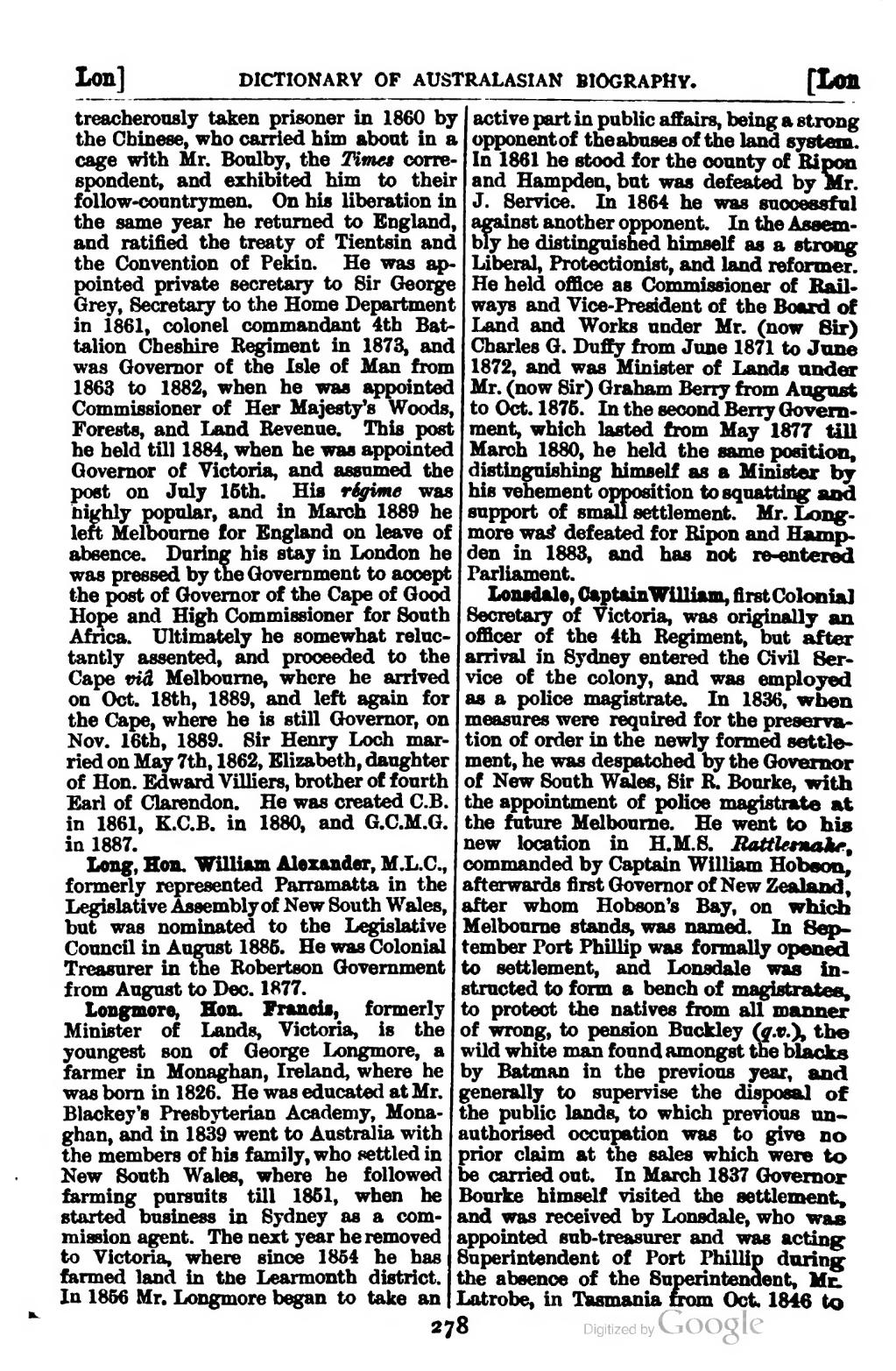treacherously taken prisoner in 1860 by the Chinese, who carried him about in a cage with Mr. Boulby, the Times correspondent, and exhibited him to their fellow-countrymen. On his liberation in the same year he returned to England, and ratified the treaty of Tientsin and the Convention of Pekin. He was appointed private secretary to Sir George Grey, Secretary to the Home Department in 1861, colonel commandant 4th Battalion Cheshire Regiment in 1873, and was Governor of the Isle of Man from 1863 to 1882, when he was appointed Commissioner of Her Majesty's Woods, Forests, and Land Revenue. This post he held till 1884, when he was appointed Governor of Victoria, and assumed the post on July 15th. His régime was highly popular, and in March 1889 he left Melbourne for England on leave of absence. During his stay in London he was pressed by the Government to accept the post of Governor of the Cape of Good Hope and High Commissioner for South Africa. Ultimately he somewhat reluctantly assented, and proceeded to the Cape viâ Melbourne, where he arrived on Oct. 18th, 1889, and left again for the Cape, where he is still Governor, on Nov. 16th, 1889. Sir Henry Loch married on May 7th, 1862, Elizabeth, daughter of Hon. Edward Villiers, brother of fourth Earl of Clarendon. He was created C.B. in 1861, K.C.B. in 1880, and G.C.M.G. in 1887.
Long, Hon. William Alexander, M.L.C., formerly represented Parramatta in the Legislative Assembly of New South Wales, but was nominated to the Legislative Council in August 1885. He was Colonial Treasurer in the Robertson Government from August to Dec. 1877.
Longmore, Hon. Francis, formerly Minister of Lands, Victoria, is the youngest son of George Longmore, a farmer in Monaghan, Ireland, where he was born in 1826. He was educated at Mr. Blackey's Presbyterian Academy, Monaghan, and in 1839 went to Australia with the members of his family, who settled in New South Wales, where he followed farming pursuits till 1851, when he started business in Sydney as a commission agent. The next year he removed to Victoria, where since 1854 he has farmed land in the Learmonth district. In 1856 Mr. Longmore began to take an active part in public affairs, being a strong opponent of the abuses of the land system. In 1861 he stood for the county of Ripon and Hampden, but was defeated by Mr. J. Service. In 1864 he was successful against another opponent. In the Assembly he distinguished himself as a strong Liberal, Protectionist, and land reformer. He held office as Commissioner of Railways and Vice-President of the Board of Land and Works under Mr. (now Sir) Charles G. Duffy from June 1871 to June 1872, and was Minister of Lands under Mr. (now Sir) Graham Berry from August to Oct. 1875. In the second Berry Government, which lasted from May 1877 till March 1880, he held the same position, distinguishing himself as a Minister by his vehement opposition to squatting and support of small settlement. Mr. Longmore was defeated for Ripon and Hampden in 1883, and has not re-entered Parliament.
Lonsdale, Captain William, first Colonial Secretary of Victoria, was originally an officer of the 4th Regiment, but after arrival in Sydney entered the Civil Service of the colony, and was employed as a police magistrate. In 1836, when measures were required for the preservation of order in the newly formed settlement, he was despatched by the Governor of New South Wales, Sir R. Bourke, with the appointment of police magistrate at the future Melbourne. He went to his new location in H.M.S. Rattlesnake, commanded by Captain William Hobson, afterwards first Governor of New Zealand, after whom Hobson's Bay, on which Melbourne stands, was named. In September Port Phillip was formally opened to settlement, and Lonsdale was instructed to form a bench of magistrates, to protect the natives from all manner of wrong, to pension Buckley (q.v.) the wild white man found amongst the blacks by Batman in the previous year, and generally to supervise the disposal of the public lands, to which previous unauthorised occupation was to give no prior claim at the sales which were to be carried out. In March 1837 Governor Bourke himself visited the settlement, and was received by Lonsdale, who was appointed sub-treasurer and was acting Superintendent of Port Phillip during the absence of the Superintendent, Mr. Latrobe, in Tasmania from Oct 1846 to
278

